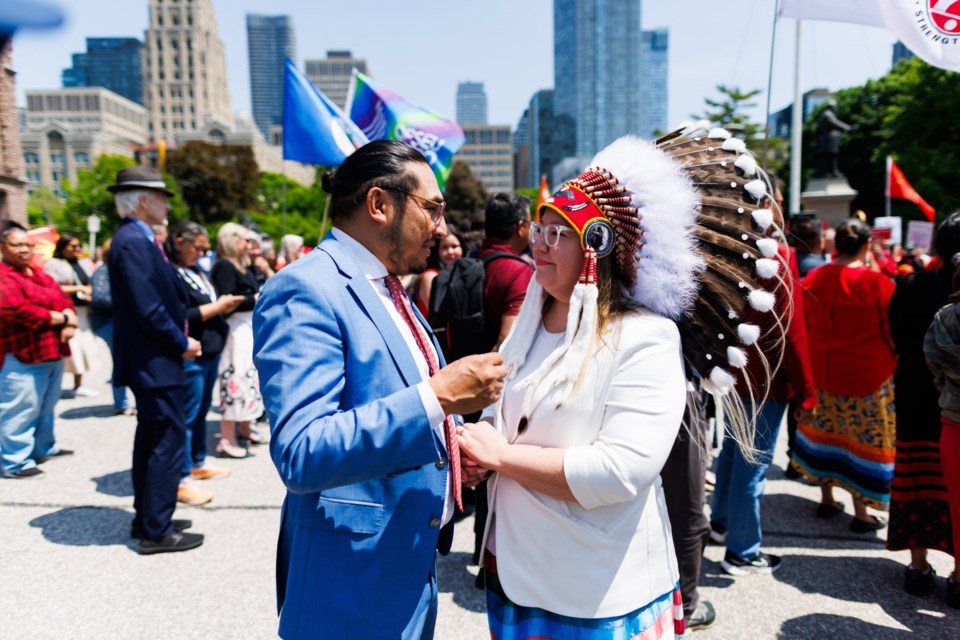OTTAWA — The Assembly of First Nations will hold an emergency meeting next week to discuss the implications of federal legislation that would speed up approvals for major projects.
National Chief Cindy Woodhouse Nepinak met Thursday with Prime Minister Mark Carney about his government's new bill, tabled Friday. She said she remains "deeply concerned" about the legislation's potential impact on First Nations.
"First Nations support efforts to protect Canada from economic uncertainty and advance resource revenue sharing agreements," she said.
"However, First Nations are very concerned that this proposal may violate many collective rights … Failure to obtain free, prior and informed consent will likely result in protracted litigation."
The legislation has two parts — one to break down internal trade barriers and the other to fast track major projects.
The bill sets out five criteria to evaluate whether a project is in the national interest. They include the project's likelihood of success, whether it would strengthen the country's resiliency and advance the interests of Indigenous peoples, and whether it would contribute to economic growth in an environmentally responsible way.
Woodhouse Nepinak said the Assembly of First Nations only received a copy of the bill Friday and the group's legal team is reviewing it with elders.
First Nations leaders were informed of the government's plans for major projects in advance but were not shown the draft legislation; they were asked to report back with any concerns within one week.
Woodhouse Nepinak previously said it wasn't clear whether the government told each First Nation of its plans or just provincial and national lobby groups that work to advance their interests.
She said she told Carney "that he needs to meet with rights-holders directly. He can't use the AFN to bypass First Nations."
Asked whether the time First Nations leaders were given to review Ottawa's plans was enough to allow the federal government to claim it consulted with Indigenous Peoples, as it did Friday, Woodhouse Nepinak said it wasn't.
"That's insufficient, and that's not acceptable," she said.
The Assembly of First Nations is an advocacy body that lobbies on behalf of rights-holding First Nations governments through resolutions passed in annual general or special assemblies.
The emergency meeting next week could see chiefs give the Assembly of First Nations direction on how they want to move forward.
"It's long overdue that we have this big talk," Woodhouse Nepinak said.
Former national chief Phil Fontaine called for the emergency meeting on Monday, saying Canada's governments are trampling on the rights of Indigenous Peoples as provinces and the federal government try to build up the economy in a hurry.
Indigenous leaders have warned widespread protests and blockades are possible if their rights aren't respected and they are not properly consulted.
"That is why it's so important that the Parliament and Senate take the time needed to ensure that First Nations and rights-holders have an opportunity to properly review, speak and propose improvements to this legislation before it is passed," Woodhouse Nepinak said.
"This bill couldn't come at a worse time for First Nations. Everybody's dealing with wildfires, so we have to make sure that we're cognizant of that, to give leadership time to respond properly."
Her meeting with Carney followed a series of comments by federal ministers about the legislation and Ottawa's duty to consult with Indigenous Peoples that Woodhouse Nepinak called "disheartening."
Crown-Indigenous Relations Minister Rebecca Alty told The Canadian Press that filling the First Nations infrastructure gap would not qualify as "nation-building" under the legislation, while Justice Minister Sean Fraser said First Nations don't get a "veto" over infrastructure projects.
This report by The Canadian Press was first published June 6, 2025.
Alessia Passafiume, The Canadian Press



